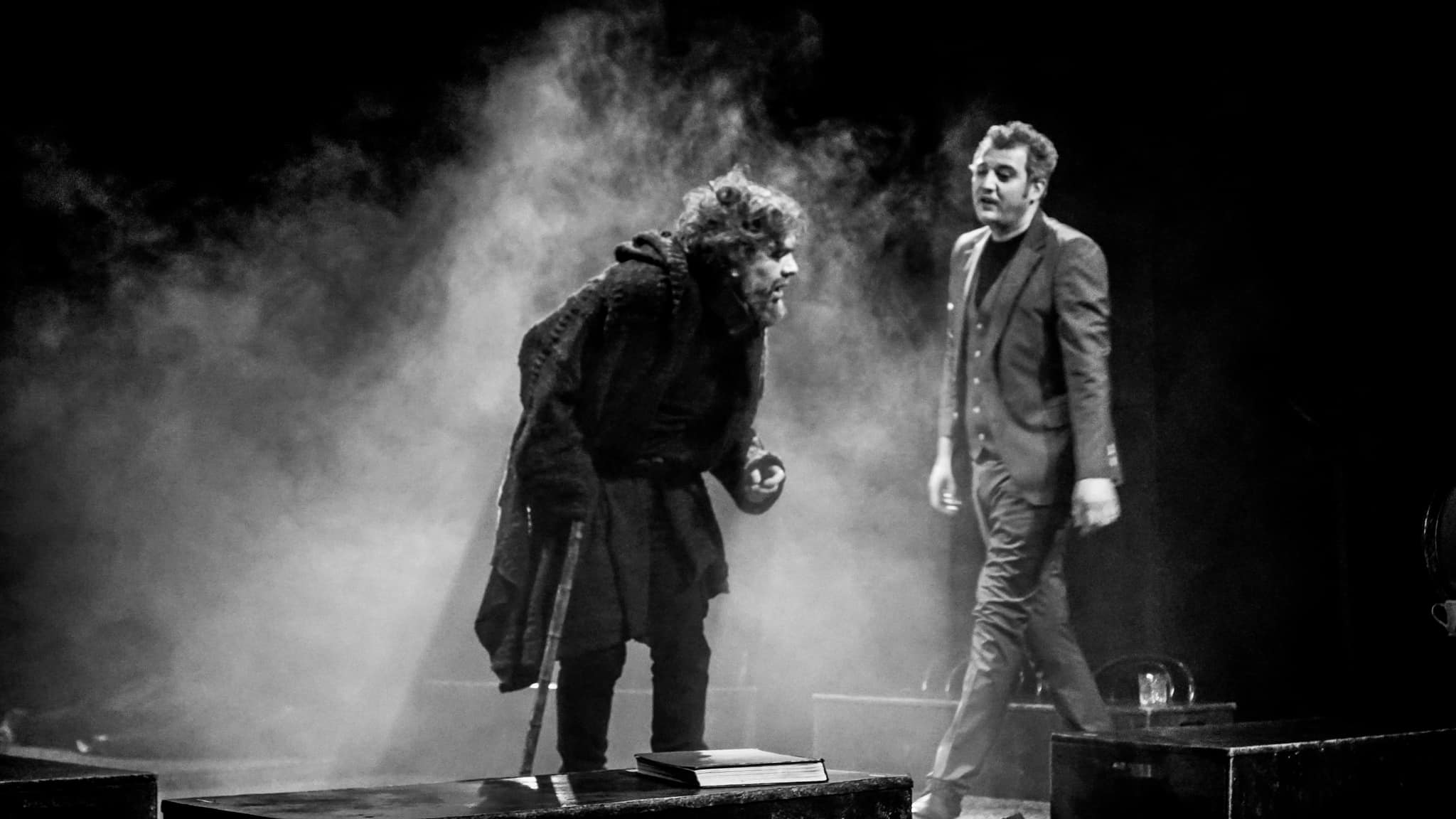ArTurbina, (National Theatre of Kosovo in Tirana), premiere 23rd January 2023
A man stands at a crossroads, driven by his ego and burdened with the heavy load of spiritual impotence and sin. He has lost his faith and finds himself in total spiritual ruin.
This new version of classic morality play Faust, written and directed by Fadil Hysaj with motifs from Goethe’s Faust and Marlowe’s Doctor Faustus, is a collaboration between three theatres from Kosovo: the National Theatre of Kosovo, the Theatre of Gjilan, and the Theatre of Prizren. It premiered on 23rd January during the Talia e Flake festival and comes to Tirana as part of a regional tour featuring four plays from the National Theatre’s repertoire (along with Club Albania, Molly, and The Women). This is a way for the National Theatre of Kosovo to present itself outside of Kosovo to Albanian-speaking audiences and is in a similar cooperative spirit to the “Moisiu” Albanian Theater Festival, the inaugural edition of which was hosted in Skopje last year.
Hysaj’s Faust is production of ambition and scale. The set consists of a podium catwalk surrounded by many rectangles that can be used as furniture or tables. At the end of the catwalk, a two-story structure with two windows above and two below appears on both sides of the stage. The left side of this is Faust’s library and contains his books and his desk. The design allows for intimacy while also being versatile enough to be able to represent a room in a house or the square of the city.
In Hysaj’s version, Doctor Faust, here played by Shkëlzen Veseli works with his mentor Dr Wagner, played by Xhevdet Doda, together in a clinic – though it can no longer be classed as a place for healing. In the opening scene a clown arrives at the clinic eager to expand the capacity of his mind and acquire knowledge. The clown’s opening monologue forewarns us about the danger of taking this shorter and easier path to acquire these things.
Like the clown, the people who come to the clinic are all looking for a means of overcoming their obsessions or their sense of spiritual impotence. While some want to acquire a child or discover what their wives think while they are having sex, others people want to improve their body, their breasts, or vocal chords.
Next we are presented with an angel with white wings (played by Sheqerie Buqaj) leaping upon a trampoline. She explains she is a flying teacher, and she is teaching a group of black-suited students how to fly. A good number of those she is training fail to fly. “Try again,” she instructs them. “One should not lose self-belief”. The lack of belief lingers in the air throughout the show.

Faust, National Theatre of Kosovo
Faust himself appears to be exhausted, both physically and spiritually. He walks with a cane, which combined with the way Veseli stoops like Quasimodo feels like an unnecessary and superfluous detail, adding little to the character.
Aside from the angel, the only character dressed in white is Faust’s love Margarete (played by Beslidhje Bytyçi), which gives the impression that she, and his love for her, is the only pure thing that Faust has in his life, while Mephistopheles, on the other hand, is dressed in red. Performed with typical brilliance by Adrian Morina, Mephistopheles finds it very easy to persuade Faust, to persuade anyone in fact, to do his bidding. Before Faust makes the final decision to sign his soul away, Mephistopheles acquires several other souls – a patriotic soul, an artistic soul, and an academic soul, whose owners have even more banal demands than Faust does.
Hysaj has expanded the story so it now roams across multiple timeframes, ranging from Adam and Eve to Ancient Greece to Medieval Europe, all the way up to modern times. This expansion means not everything flows smoothly in terms of the storytelling and the play appears to lose its way at times, like a ship rolling on the waves and frequently disappearing from view on the horizon. Nonetheless, it manages to navigate a course until the end, while also creating some powerful episodes along the way.
Perhaps the most powerful moment is Mephistopheles’ speech, given in front of a church altar during the scene of Margarete’s mother’s final farewell. Powerful as it is, this speech is like reaching the peak of a mountain from which you’re not sure how you’ll get down.
In Hysaj’s version of Faust, the protagonist’s biggest drive is his love for Margarete, though he is actually moving away from her more and more, while Margarete is drawn into the absorbing vortex of Faust’s sin.
The later transportation of Faust to Troy does not change the narrative overly. He falls in love with Helen of Troy, well-played by Zana Berisha, just as he did with Margarete, and she gives birth to a half-demon son; the fatalistic ending to this strand of the story, with its double death, portrays the same fate. The sin is carried from story to story.
It’s a very atmospheric production. The tension created by the music and dynamic choreography gives the impression that you are inside a dark, mesmerizing vortex and, with its stark black, white and red design, the production is both a visually appealing and theatrically engaging experience.
But despite the character’s vicious spiral into tragedy, it feels like Hysaj doesn’t want to let you leave the theatre with a bitter taste in your mouth. He succeeds in this respect. This version of Faust feels like a story told long after the events have taken place in which the sharp edge have been softened by time and the emotional weight lightened in order to allow more space for reflection. And, so, the curtain falls, or rather the lights go out, with Mephistopheles exhausted as the angel sings softly to him.
Credits:
Adaptor and director: Fadil Hysaj//Choreography: Robert Nuha//Scenography: Mentor Berisha//Costume: Youliana Voykova-Najman//Composer: Memli Kelmendi// Lighting Design: Yann Perregaux
Cast: Shkelzen Veseli, Adrian Morina, Xhevdet Doda, Beslidhje Bytyqi, Aurita Agushi, Shpetim Kastrati, Kushtrim Qerimi, Sheqerie Buqaj, Liridona Shehu, Ali Demi, Alban Krasniqi, Zana Berisha, Emine Toska, Rifat Smani, Valmira Hoti, Mejreme Berisha, Alban Morina
Further reading: review of Club Albania at National Theatre of Kosovo
Further reading: interview with Adrian Morina: “I hope Kosovo cab become more open-minded towards artists.”
Flamur Dardeshi is a freelance writer based in Tirana. He has contributed in the areas of translation, analysis, and poetry. His main fields of interest are literature, cinematography, and theatre.








